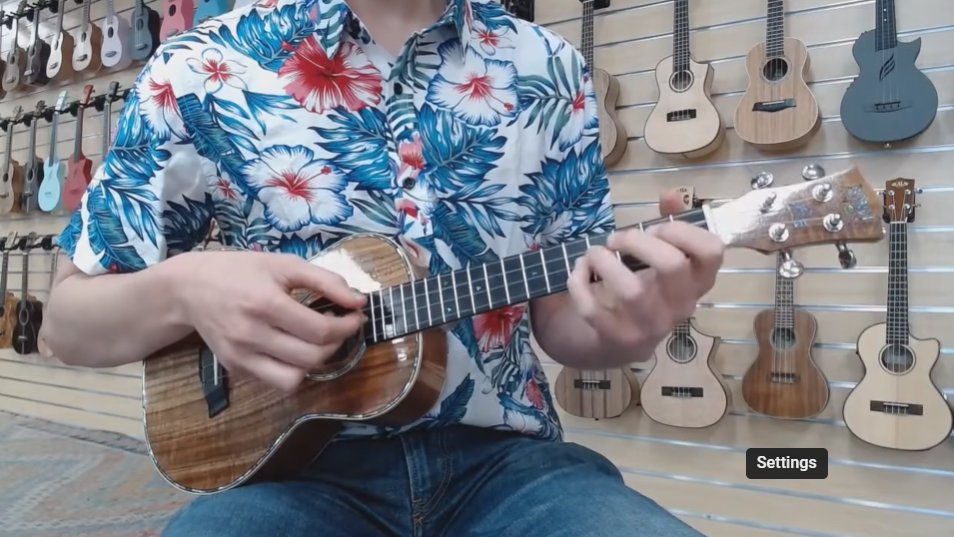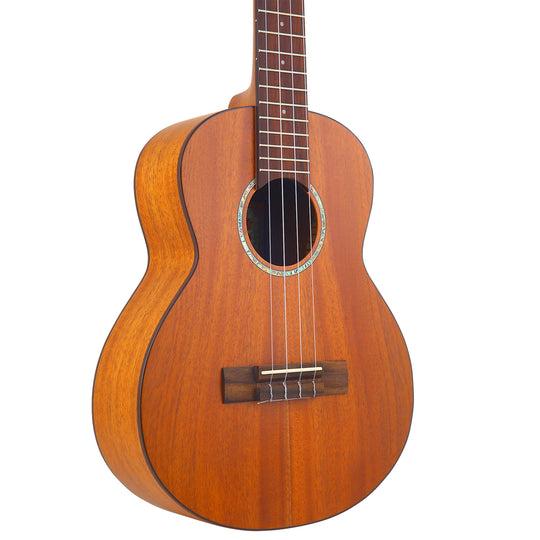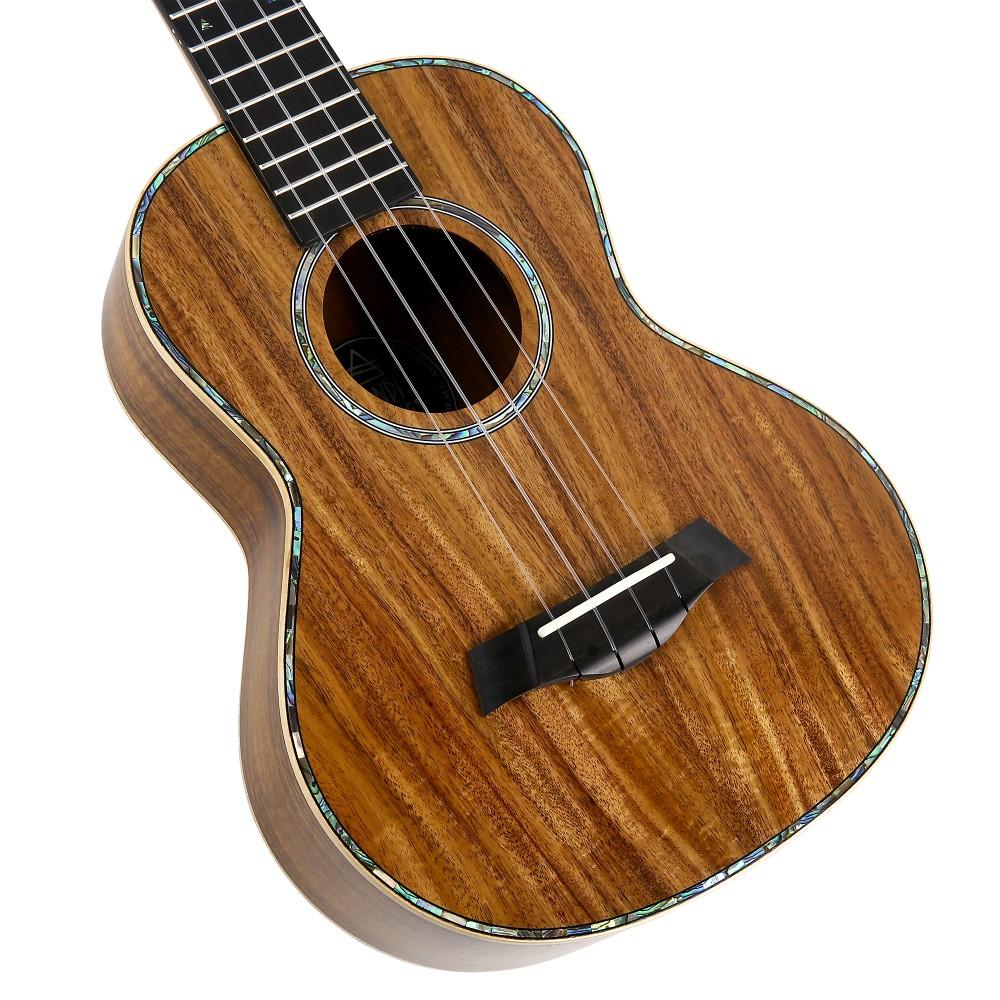Mahogany vs. Koa: Which Tonewood is Best for Tenor Ukuleles?

When you're on the hunt for a tenor uke, one of the key things to suss out is the tonewood. Tonewoods, or the types of timber used to craft the body of the instrument, are a big deal when it comes to the sound and feel of your uke.
Two of the top picks for tenor ukes are mahogany and koa. Both churn out warm, rich tones, but they’ve got their own vibe when it comes to sound, looks, and cost.
So, which one's the right fit for you? Let’s break down the features of mahogany and koa so you can make a ripper choice.
Understanding the Tenor Ukulele
Before we dive into the specifics of mahogany and koa, let's touch on the tenor ukulele itself. The tenor is one of the four main ukulele sizes, sitting between the concert and baritone in terms of size.
It offers a fuller sound, longer fretboard, and deeper tone compared to its smaller siblings. Because of its versatility, the tenor uke is favored by both beginners and professionals alike.
Here’s where it gets interesting:
Whether you’re a strummer, a fingerpicker, or someone who enjoys solo playing, the tenor ukulele provides excellent playability and a robust sound. Now, onto the tonewoods!
Mahogany: The Warm and Balanced Performer
Tonal Characteristics
Mahogany is one of the most popular tonewoods for ukuleles due to its warm, balanced sound. It delivers a rich midrange with smooth overtones, making it ideal for players who want a more subdued, mellow tone.
While mahogany isn't as bright as koa, it offers exceptional clarity and works well for strumming as well as fingerpicking.
But here’s why that matters:
In the world of ukuleles, mahogany is often praised for its consistency. It doesn’t have too many peaks in either the low or high ends, so you can expect a well-rounded tone that suits a variety of music styles.
This makes mahogany tenor ukuleles an excellent choice for beginners who are still exploring their sound preferences.
Appearance
Mahogany’s aesthetic appeal lies in its reddish-brown hue, which darkens beautifully over time. While it lacks the striking grain patterns seen in koa, its understated look can be very attractive. Many players love the simple, vintage appearance of mahogany instruments, which often have a satin or matte finish to complement the wood's natural beauty.

Durability and Affordability
Mahogany is a relatively affordable tonewood, making it accessible to players at all levels. It’s also known for being durable and stable, so you won’t have to worry too much about temperature or humidity affecting your instrument’s performance. This durability makes mahogany ukuleles perfect for travel or outdoor performances.
Who Should Choose Mahogany?
If you're looking for a tenor ukulele that offers a warm, well-rounded tone at an affordable price point, mahogany is a fantastic option. Its balanced sound and durability make it an excellent choice for beginners and experienced players alike.
Koa: The Traditional Hawaiian Beauty
Tonal Characteristics
Koa is the traditional wood for Hawaiian ukuleles and is revered for its bright, crisp sound. Koa offers a unique tonal range that starts off bright but mellows out the more you play it, providing a beautiful blend of clarity and warmth over time.
This evolving tone makes koa particularly appealing for seasoned players who want an instrument that develops character as they continue to play.
Koa tends to emphasize the higher frequencies, delivering a brilliant, shimmering treble. However, it also produces a well-rounded low end, giving it a full-bodied sound that’s ideal for both strumming and fingerstyle techniques.
If you’re aiming for that classic, Hawaiian ukulele sound, koa is the tonewood you should be looking at.
Appearance
One of the standout features of koa ukuleles is their stunning visual appeal. Koa wood is known for its intricate grain patterns and lustrous finish, which can range from golden brown to a deep, reddish-brown with beautiful streaks.

Many koa ukuleles boast highly figured grain patterns, such as curl or flame, which add to their allure. This visual beauty makes koa instruments highly desirable, often turning them into collector's items.
Durability and Affordability
While koa ukuleles are undeniably beautiful, they come with a higher price tag due to the rarity of the wood. Koa trees are native to Hawaii, and the limited supply drives up the cost. However, for many players, the tonal and visual rewards are worth the investment.
But that’s not all:
In terms of durability, koa is a hardwood, making it a solid and stable choice for a ukulele. However, like many high-end tonewoods, koa is more sensitive to changes in humidity and temperature than mahogany.
If you live in an area with fluctuating weather, you’ll want to take extra care of your koa ukulele to prevent cracking or warping.
Who Should Choose Koa?
Koa is perfect for players seeking a premium instrument that not only sounds incredible but also looks like a work of art. If you’re after the traditional Hawaiian ukulele sound with a brighter tone that mellows over time, koa is the ultimate choice.
Its visual appeal also makes it a favorite among those who value aesthetics as much as sound quality.
Mahogany vs. Koa: Which One Is Right for You?
Now that you know the key differences between mahogany and koa, how do you decide which tonewood is best for your tenor ukulele?
- Budget: If you're on a budget or new to the ukulele, a mahogany tenor uke is a fantastic choice. It’s affordable, durable, and produces a balanced, warm tone that works well for all styles of playing.
- Tone: If you're looking for a more mellow and consistent sound, mahogany is your go-to wood. However, if you want that classic bright, shimmering sound that evolves with time, koa might be worth the extra investment.
- Aesthetics: While mahogany has a classic, understated look, koa is known for its stunning grain patterns and luxurious appearance. If visuals are just as important to you as sound, koa could be the right choice.
- Playing Style: Both woods are versatile, but if you tend to favor fingerpicking or want a brighter, more dynamic sound, koa might be a better fit. On the other hand, if you prefer strumming with a richer, warmer tone, mahogany would suit you well.
Are You Ready To Choose Your Tenor Ukulele?
In the end, the choice between mahogany and koa comes down to personal preference. Both tonewoods offer unique tonal characteristics, aesthetics, and price points, making them suitable for different types of players.
Whether you choose the warm, balanced tones of mahogany or the bright, evolving sound of koa, investing in a quality tenor ukulele will enhance your playing experience and help you discover the beauty of this instrument.
If you're keen to find the perfect tenor uke, have a squiz at our tenor ukulele collection at Ukulelemate. We've got a ripper range of top-notch ukes, whether you're just kicking off your musical adventure or you're a seasoned strummer after a primo instrument. Happy strumming!
 Lifetime Warranty
Lifetime Warranty  60 Day Returns Policy
60 Day Returns Policy 1-2 Day Delivery
1-2 Day Delivery 






























Leave a comment